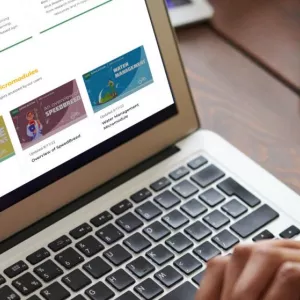IRRI Education introduces more than 50 micromodules for enhanced online learning
IRRI Education, the educational arm of the International Rice Research Institute (IRRI), is driving efforts to strengthen its online learning platform through the introduction of over 50 microlearning modules or micromodules. “This endeavor is reaching new heights of disseminating cutting-edge technologies, and knowledge riding on IRRI’s research and innovations to a broader audience and fostering development in rice sciences,” said

IRRI Education introduces more than 50 micromodules for enhanced online learning
IRRI Education, the educational arm of the International Rice Research Institute (IRRI), is driving efforts to strengthen its online learning platform through the introduction of over 50 microlearning modules or micromodules.
“This endeavor is reaching new heights of disseminating cutting-edge technologies, and knowledge riding on IRRI’s research and innovations to a broader audience and fostering development in rice sciences,” said Gopesh Tewari, Head of IRRI Education.
IRRI Micromodules are short and interactive e-learning courses presented in SCORM (Sharable Content Object Reference Model) multimedia format, covering a wide range of agricultural topics, including the latest technological innovations, best practices, concepts, and trends. The introduction of over 50 micromodules represents IRRI Education’s commitment to capacitating diverse learners, marking a milestone in its pursuit of excellence through education.
Unlike traditional learning modules, they follow the concept of microlearning, breaking down complex topics into bite-sized information to enhance retention and achieve better learning objectives. This approach also allows for easier creation, maintenance, and distribution of courses, resulting in higher completion rates. Additionally, micromodules feature knowledge checks, links to supplementary materials, and full-text publications for further learning.
“We see the need to empower the agricultural sector through enhanced educational communication. Through this online learning initiative, we bridge the gap between technical experts and the public, leveraging the pivotal role of educational technology and innovations in equipping our stakeholders with the latest knowledge and breakthroughs in agriculture,” said Gaurav Jaiswal, IRRI Education educational technology specialist in an interview.
The benefits of microlearning modules are numerous. They allow for flexible learning, as learners can access the material at their own pace and on their own schedule. They also cater to different learning styles, as they offer a range of interactive and engaging activities that cater to visual, auditory, and kinesthetic…

